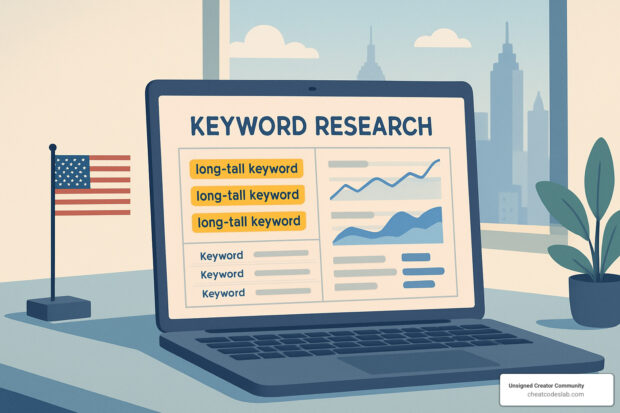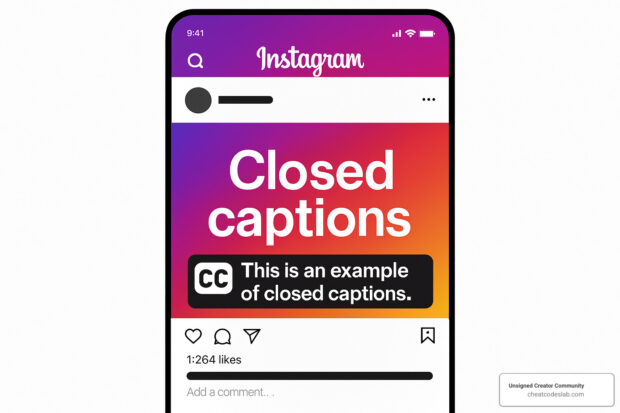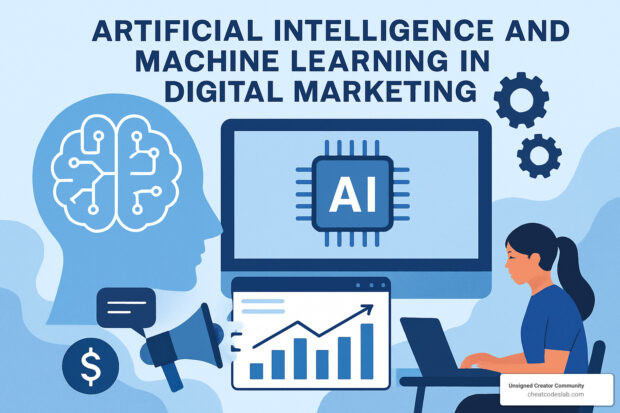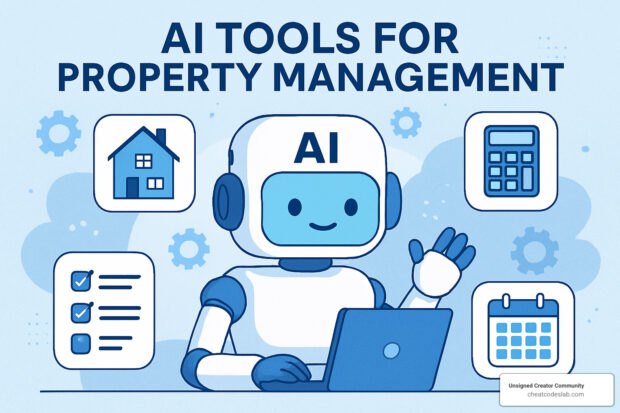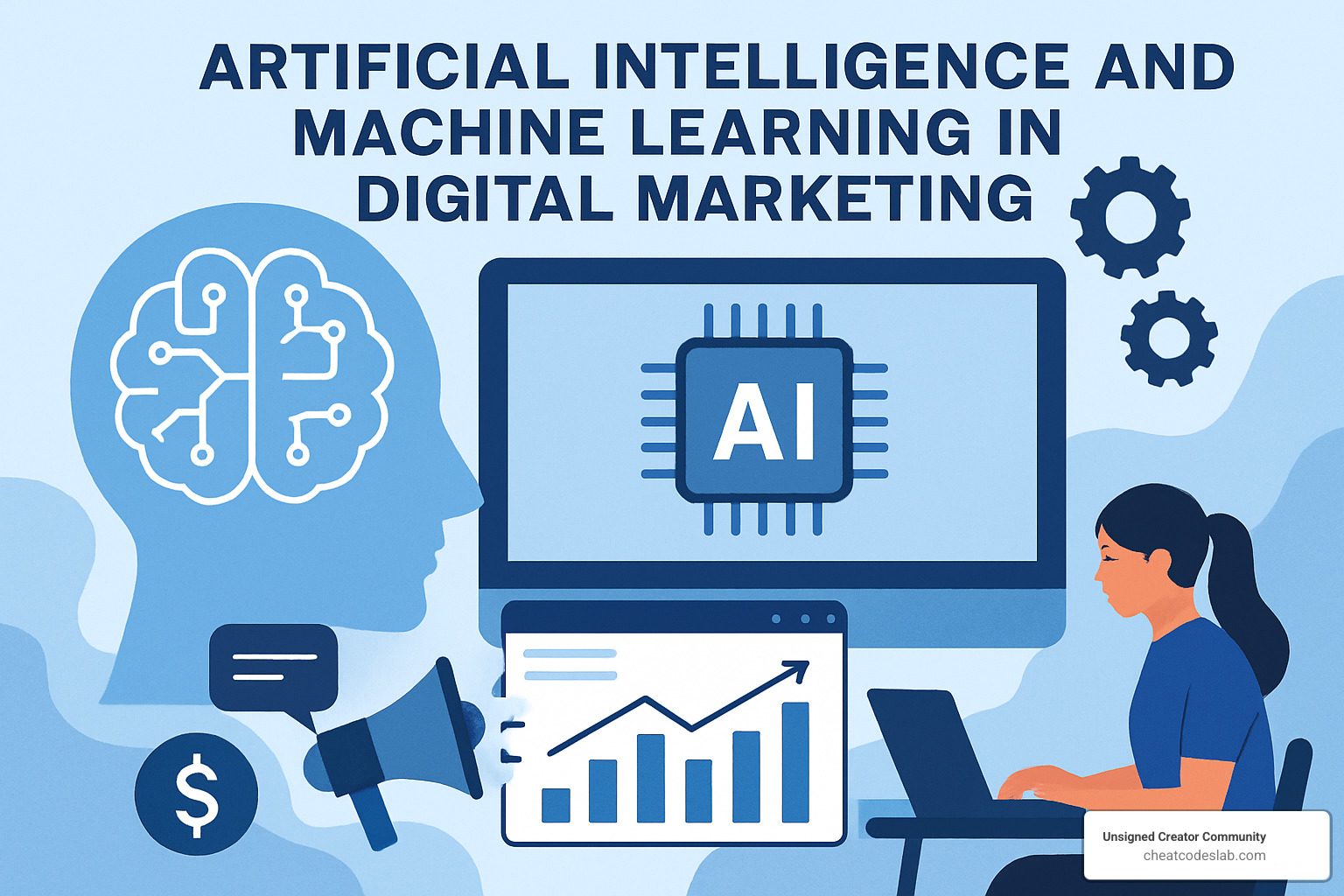
Artificial Intelligence and Machine Learning in Digital Marketing: 7 Powerful Positive Trends 2025
Changing Marketing: The AI & ML Revolution
Artificial intelligence and machine learning in digital marketing are changing how brands connect with consumers through automated analysis, personalization, and optimization. Here’s what you need to know:
- Data Analysis: AI systems analyze vast amounts of customer data to identify patterns and insights humans might miss
- Personalization: ML algorithms create custom experiences based on individual behavior and preferences
- Predictive Analytics: AI forecasts customer actions, helping marketers anticipate needs and optimize campaigns
- Content Creation: Generative AI tools assist in creating and optimizing marketing content at scale
- Ad Optimization: ML systems continuously improve ad targeting, bidding, and placement for better ROI
- Customer Service: AI chatbots provide 24/7 support and gather valuable interaction data
The AI in marketing market is expected to grow from $6.5 billion in 2020 to $40.1 billion by 2025, at a CAGR of 44.9%. This explosive growth reflects how essential these technologies have become for competitive marketing strategies.
In today’s digital landscape, marketers face an overwhelming volume of customer data. Traditional analysis methods simply can’t keep pace. AI and ML tools have emerged as the solution, enabling marketers to process information at lightning speed, uncover actionable insights, and deliver personalized experiences that were previously impossible.
I’m digitaljeff, a tech entrepreneur and content strategist with over 20 years of experience implementing artificial intelligence and machine learning in digital marketing strategies for brands that have generated over 1 billion social media views in the past year alone.

Terms related to artificial intelligence and machine learning in digital marketing:
– AI-based marketing solutions
– AI SEO software
– how to use ai for digital marketing
Artificial Intelligence and Machine Learning in Digital Marketing: Essentials & Impact
When we talk about artificial intelligence and machine learning in digital marketing, we’re looking at two related technologies that are completely changing how brands connect with customers.
Artificial Intelligence (AI) is like the smart friend who can handle complex tasks that usually need human brainpower – things like recognizing images, understanding speech, making decisions, and translating languages.
Machine Learning (ML), on the other hand, is AI’s studious cousin that gets better through experience. Instead of following rigid instructions, ML systems learn patterns from data and improve over time without someone constantly telling them what to do.
Why are marketers so excited about these technologies? Well, McKinsey analyzed over 400 advanced use cases and found that marketing stands to gain the most value from AI adoption. This makes perfect sense when you think about it – marketing’s core activities (understanding customers, matching them to products, and persuasion) align beautifully with what AI does best.
| Technology | Description | Marketing Applications |
|---|---|---|
| Artificial Intelligence (AI) | Systems that mimic human intelligence and can perform tasks like reasoning, problem-solving, and perception | Customer service chatbots, content personalization, strategic decision-making |
| Machine Learning (ML) | Subset of AI that learns from data without explicit programming | Customer segmentation, predictive analytics, recommendation engines |
| Generative AI | AI systems that create new content like text, images, audio | Content creation, ad copy generation, product descriptions |
The real-world impact of artificial intelligence and machine learning in digital marketing is already impressive. Marketers are saving an average of 2 hours and 24 minutes daily through AI and automation – that’s over 12 hours every week! About 71% of marketers using AI report better personalization capabilities, while 40% primarily use it for data analysis and reporting. Content creation isn’t far behind, with 38% using AI to help craft their messages (though only 6% publish without human editing – we’re not quite ready to hand over the keys completely).

How Artificial Intelligence and Machine Learning in Digital Marketing Power Personalization
Remember when personalization meant just adding someone’s first name to an email? Those days are long gone. Research shows that today’s consumers feel more comfortable and are more likely to purchase when AI personalizes their experiences.
Dynamic Content Delivery has evolved far beyond basic rules. Modern AI systems analyze user behavior in real-time and serve up content custom to each customer segment. Take Netflix, for example – they show different thumbnail images for the same show based on your viewing history. If you watch comedies, you might see a funny scene as the thumbnail, while drama fans might see something more serious.
Advanced Customer Segmentation is another game-changer. Traditional methods relied on broad demographic buckets like “women 25-34,” but ML takes this to a whole new level. It identifies micro-segments based on browsing habits, time spent on specific pages, purchase history, email engagement, and even social media activity. The best part? ML can reveal valuable customer groups that marketers would never have finded manually.
Recommendation Engines might be the most visible application of ML in personalization. These smart systems analyze your past purchases, browsing history, items frequently bought together, and similar customer profiles to suggest products you’ll love. Amazon attributes up to 35% of its revenue to its recommendation engine – a powerful testament to this approach.
With Real-Time Targeting, ML helps marketers adapt on the fly based on user behavior. This includes adjusting ad bidding strategies when someone looks ready to convert, sending emails when you’re most likely to open them, changing website layouts based on how you engage, and deploying chatbots when you seem confused or ready for help.
Want to dive deeper into how AI is revolutionizing content creation? Check out our guide on AI-Driven Content Creation.
Measuring ROI of Artificial Intelligence and Machine Learning in Digital Marketing
So you’ve implemented AI in your marketing – but how do you know if it’s actually working? Measuring ROI for AI and ML initiatives takes some strategic thinking.
Start with the right Key Performance Indicators (KPIs). Are your AI-optimized campaigns converting better? Has your customer acquisition cost dropped? Are customers influenced by AI worth more over their lifetime? Are personalized experiences driving higher engagement? And how much time and resources are you saving through automation?
Uplift Modeling is a powerful ML technique that goes beyond basic metrics. Rather than just measuring overall conversion rates, uplift models help you understand who will convert because of your campaign, who would have converted anyway, who will never convert, and (importantly) who might be turned off by your campaign. This precision helps you target the right people and allocate your marketing budget more effectively.
Traditional A/B Testing is getting a makeover with ML-powered Multi-Armed Bandit approaches. Instead of splitting traffic equally between versions until you declare a winner, multi-armed bandits continuously adjust traffic allocation to favor better-performing variants. This means faster results and less wasted opportunity during testing periods.
Customer Lifetime Value Forecasting uses ML to predict how valuable different customers will be over time. This helps you identify high-potential customers early, tailor your retention strategies to different segments, and focus your resources where they’ll have the biggest impact.
Attribution Modeling has been completely transformed by ML. Instead of simplistic “last-click” models, ML helps marketers understand the complex customer journey across multiple touchpoints:
- Vision Level: How marketing supports overall business goals
- Strategic Level: How to allocate budget across channels
- Tactical Level: How to optimize specific campaigns
- Execution Level: How to perfect real-time bidding and placement
Research shows ML delivers the most value at the strategic and tactical levels of marketing attribution.
For a deeper dive into AI’s marketing value, check out this Scientific research on AI value in marketing.
From Strategy to Execution: Tools, Ethics, and Future Trends
Implementing artificial intelligence and machine learning in digital marketing isn’t just about adopting fancy tech—it’s about thoughtfully integrating these powerful tools into your existing marketing ecosystem. Let me walk you through how this actually works in practice.

When marketers talk about predictive analytics, they’re referring to something truly game-changing: using historical data to see into the future (well, almost). Imagine being able to forecast which customers are likely to leave before they even think about it, or predicting next quarter’s sales with surprising accuracy. That’s the power of AI-driven prediction—it transforms marketing from reactive to proactive, allowing you to address customer needs before they even express them.
Content creation has been completely transformed by AI. From drafting blog posts to generating social media updates and crafting compelling ad copy, AI tools are becoming indispensable writing partners. But here’s the reality check: only 6% of marketers publish AI-generated content without human editing. The sweet spot is the human-AI collaboration, where technology handles the heavy lifting while human creativity adds the special sauce that resonates with audiences.
In digital advertising, ML algorithms have become the unsung heroes behind the scenes. Google’s Smart Bidding, for instance, makes thousands of micro-adjustments to your bids throughout the day based on countless signals—something no human media buyer could ever accomplish manually. These systems analyze past performance, predict conversion likelihood, and optimize your ad spend in real-time, often delivering significantly better ROI than manual approaches.
Chatbots have come a long way from the frustrating automated systems of the past. Today’s AI-powered conversational interfaces can handle complex customer service interactions, make personalized product recommendations, and even track orders—all while collecting valuable data about customer preferences. The best part? They work 24/7, never need coffee breaks, and free up your human team for tasks that require emotional intelligence and creative problem-solving.
The way people search is evolving rapidly with voice assistants like Alexa and visual search tools like Google Lens becoming increasingly common. These technologies require marketers to rethink their content strategies: voice search favors conversational content that answers specific questions, while visual search demands excellent image optimization and product photography. Brands that adapt early to these new search modalities will enjoy a significant competitive advantage.
Want to explore more AI-based marketing solutions? Check out our comprehensive guide for deeper insights.
Data Foundations & Top Use Cases
Let’s be honest: AI is only as good as the data it learns from. With privacy regulations tightening and third-party cookies crumbling, first-party data has become marketing gold.
Smart marketers are building robust strategies to collect and activate data from direct customer interactions, website behavior, purchase history, email engagement, and customer feedback. This first-party data isn’t just more compliant—it’s often more accurate and relevant than third-party alternatives.
But having data isn’t enough—it needs to be good data. When I talk with clients about implementing AI, I always emphasize the importance of data quality. Is your information accurate and error-free? Are there gaps in your datasets? Is the formatting consistent across sources? Is everything up-to-date? These questions might seem basic, but they’re critical. Poor-quality data leads to what we call “garbage in, garbage out” in AI—no algorithm, however sophisticated, can overcome fundamentally flawed input.
Among the many use cases for artificial intelligence and machine learning in digital marketing, several consistently deliver outstanding results. Customer segmentation has evolved from basic demographics to sophisticated behavioral clustering that reveals unexpected patterns. Churn prediction helps identify at-risk customers before they leave, enabling proactive retention efforts. Demand forecasting optimizes inventory and marketing spend by anticipating future needs. Sentiment analysis provides real-time insights into how customers feel about your brand across social platforms and review sites. And content performance prediction helps marketers forecast which content pieces will resonate before investing significant resources in production.
For a deeper dive into how AI can boost your analytics, take a look at our guide to AI Tools for Analytics.
Toolbox: Content, SEO, Analytics, CRM
The AI marketing tool landscape has exploded in recent years, offering solutions for virtually every aspect of digital marketing. Let me share some standouts that are making a real difference for marketers today.
For content creation, tools like Jasper have become invaluable partners for marketers struggling to produce high volumes of quality content. Copy.ai excels at generating various marketing formats, while Grammarly uses AI to lift writing quality and maintain brand voice consistency.
SEO professionals are increasingly relying on AI-powered platforms like SurferSEO, which analyzes top-ranking content and provides data-driven optimization recommendations. Clearscope helps identify relevant keywords and content gaps, while MarketMuse creates AI-driven content briefs that align with search intent.
On the analytics front, even familiar tools like Google Analytics now incorporate ML features for anomaly detection, predictive metrics, and smart segmentation. More advanced platforms like Adobe Analytics offer AI-powered attribution and segment findy, while Mixpanel provides behavioral analysis that can predict future user actions.
Customer relationship management has been transformed by AI integration. Salesforce Einstein adds an intelligence layer that provides predictions and recommendations across the customer journey. HubSpot’s AI tools include predictive lead scoring and content recommendations, while Drift uses conversational AI to qualify leads and book meetings automatically.
Social media management platforms haven’t been left behind. Buffer AI helps optimize posting schedules for maximum engagement, Hootsuite Insights leverages AI for social listening, and Sprout Social offers AI-powered reporting to identify trends and opportunities.
For a comprehensive look at AI-powered content creation tools, don’t miss our guide to AI SEO Content Generator.
According to a recent survey of CMO attitudes toward GenAI, 81% of marketing leaders plan to use generative AI for new business models in the next 12-18 months. This isn’t just experimentation anymore—AI has become essential for competitive marketing organizations.
Challenges, Ethics, and What’s Next
While the benefits of artificial intelligence and machine learning in digital marketing are undeniable, implementing these technologies comes with significant challenges that marketers need to steer thoughtfully.
Regulatory compliance has become increasingly complex as privacy laws evolve worldwide. From Europe’s GDPR to California’s CCPA/CPRA and industry-specific regulations like HIPAA, marketers must ensure their AI systems respect legal requirements while still delivering personalization. This isn’t just about avoiding fines—it’s about building trust with your audience.
The “black box” problem remains one of AI’s biggest challenges. As systems become more sophisticated, explaining exactly how they reach specific decisions becomes harder. Yet consumers and regulators increasingly demand transparency about how data is used and decisions are made. Developing explainable AI isn’t just good ethics—it’s good business in a world where trust is a valuable currency.
Bias in AI systems is a particularly thorny issue. These systems learn from historical data, which often contains embedded biases. Without careful oversight, AI can perpetuate or even amplify these biases—whether they’re related to representation (some groups being underrepresented in training data), confirmation (systems reinforcing existing assumptions), or measurement (metrics not accurately reflecting diverse experiences). Regular bias audits and diverse training data aren’t optional extras—they’re essential for ethical AI implementation.

The AI skills gap presents another significant hurdle. Organizations need people with technical skills in data science and ML engineering, strategic skills in AI ethics and business application, and increasingly, hybrid roles that combine marketing expertise with AI knowledge. Smart companies are investing in training, strategic hiring, and partnerships to build these capabilities rather than expecting to find unicorn candidates who possess all these skills.
Looking toward the horizon, several trends will shape the future of AI in marketing. Voice AI continues to mature, creating new opportunities for audio content and voice-based interactions. Multimodal generative AI systems that can create and understand multiple content types (text, images, audio) are opening exciting creative possibilities. Return on AI Investment (ROAI) metrics are becoming more sophisticated as organizations seek to measure AI’s true business impact. Edge AI processes data locally for faster, more private personalization, while federated learning allows models to be trained across devices without centralizing sensitive data.
At Unsigned Creator Community by CheatCodesLab, we’re passionate about helping marketers steer these trends and leverage AI ethically and effectively. We believe that technology should amplify human creativity, not replace it.
For more insights on how AI is revolutionizing marketing analytics, explore our guide to AI-Driven Marketing Insights or browse our complete collection of AI resources.
Conclusion
Artificial intelligence and machine learning in digital marketing have transformed from cutting-edge experiments to must-have tools in today’s digital landscape. These technologies give marketers superpowers – analyzing mountains of data in seconds, delivering truly personal experiences at scale, predicting what customers want before they know it themselves, and handling repetitive tasks while humans focus on creative work.
But here’s the thing – the magic happens when we blend AI’s computational power with human creativity and ethical judgment. The best marketing teams don’t just deploy AI tools; they guide them with human expertise and values that machines simply can’t replicate.
Looking ahead, the winners in this new landscape will be organizations that approach AI strategically. This means investing in quality data (the fuel that powers AI), developing team skills to work alongside these technologies, and maintaining ethical practices that build rather than erode consumer trust.
At Unsigned Creator Community, we’re passionate about helping marketers steer this AI-powered future with confidence. We’ve developed certified AI tools and practical “cheat codes” for content marketing and SEO that empower creators and agencies to achieve more without sacrificing quality.
For a deeper dive into how AI can transform your marketing efforts, explore our comprehensive AI pillar resources.
The goal isn’t to replace human marketers – it’s to free them from mundane tasks so they can focus on what humans do best: developing innovative strategies, creating emotionally resonant content, and building genuine connections with customers. In these distinctly human domains, people still outshine even the most sophisticated machines.
The future of marketing isn’t AI versus humans – it’s AI and humans, working together to create experiences that were never before possible.






